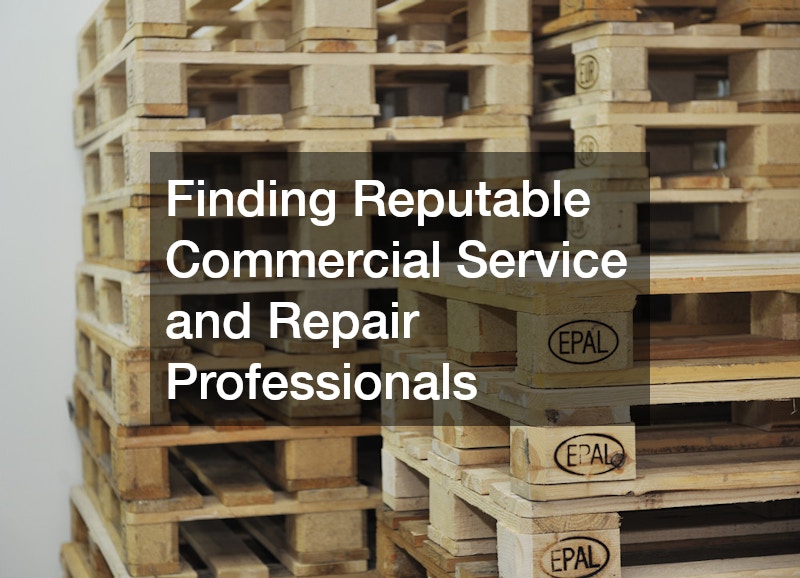
In the fast-paced world of business, smooth operations hinge on the efficiency and reliability of commercial facilities, equipment, and systems. From HVAC and plumbing to electrical and IT infrastructure, commercial service and repair professionals are essential to maintaining operational continuity. A breakdown or service interruption can mean more than just inconvenience—it can lead to lost revenue, customer dissatisfaction, and even safety hazards. That’s why it’s critical to find trustworthy, qualified professionals who deliver top-tier service.
The challenge lies in navigating the crowded market of service providers and making informed decisions based on expertise, reputation, and value. Whether you’re managing an industrial property, running a small business, or overseeing a large commercial facility, this guide will help you understand what to look for and how to find reputable professionals for your needs.
What are Commercial Service and Repair Professionals?

Overview of Commercial Services
Commercial service and repair professionals are specialists trained to handle maintenance, repair, and installation tasks within commercial and industrial environments. Unlike residential professionals who focus on private homes, commercial experts work on larger, more complex systems tailored to the scale and regulatory requirements of businesses.
These professionals serve a wide array of business types—from office buildings and retail outlets to factories and hospitality venues. Common services include HVAC maintenance, electrical repairs, plumbing solutions, and facility upgrades. When it comes to preserving the value and functionality of an industrial property, having dependable service technicians is not just helpful—it’s essential.
Types of Repair Professionals
The field includes a wide range of professionals such as HVAC technicians, electricians, plumbers, mechanics, elevator specialists, and IT support engineers. For example, commercial plumbing services handle complex systems with multiple access points, higher water pressures, and specific industry codes. Similarly, a commercial roofing contractor works with durable materials like TPO and EPDM to provide long-lasting solutions for business facilities.
Some professionals specialize in outdoor services, such as maintaining grounds using a business mower or ensuring pristine exteriors with the help of commercial power washers. Pool repairs for hotels and recreation centers also require specialists who understand health codes and water management systems.
Differences from Residential Services
Commercial services differ significantly from residential work. They often require broader knowledge, higher certifications, and specialized equipment. A residential HVAC technician, for example, may not be qualified to work on industrial generators or large-scale air handling systems common in commercial setups. Similarly, commercial plumbers must understand grease traps, backflow prevention, and multi-story water systems, all of which go far beyond residential plumbing needs.
Key Benefits for Businesses
Hiring the right professionals ensures compliance with safety codes, extends equipment lifespan, and reduces downtime. For businesses operating in environments where uptime is critical—such as manufacturing plants, hospitals, or data centers—these benefits directly translate into cost savings and operational efficiency. In addition, routine servicing from a qualified commercial service provider helps avoid costly emergency repairs and keeps clients and customers satisfied.
Relevant Industries and Sectors
Commercial service professionals support industries including healthcare, hospitality, manufacturing, retail, education, and property management. From handling blacktop sealers for parking lots to installing pavers for outdoor walkways, each sector has unique needs. Understanding which professionals are most suitable for your industry is crucial to getting the best value and service.
How to Find Qualified Commercial Repair Services
Research and Background Checks
Start by conducting thorough research. Investigate a provider’s business history, look up public reviews, and check for any past legal disputes or complaints. Especially for high-stakes tasks like working with industrial generators or managing HVAC systems in large spaces, you’ll want a provider with a proven track record.
Certifications and Licenses
Make sure any professional you consider holds the appropriate certifications and licenses for their specialty and region. Whether you need a licensed commercial plumbing expert or a certified technician for ac repair company services, verification is a must.
Referral and Recommendation Systems
Word-of-mouth referrals from other businesses can be incredibly reliable. Ask for recommendations within your professional network or consult industry-specific forums. Referrals often lead you to providers who have already proven themselves in similar operational environments.
Utilizing Online Platforms
Websites like Angi, Thumbtack, and even Google Business listings provide valuable insight into service quality. Look for consistency in positive reviews and responsiveness. For example, if a commercial roofing contractor consistently receives high ratings for durability and follow-up service, they are likely a safe bet.
Networking at Industry Events
Trade shows, expos, and local chamber of commerce events are great places to meet reputable providers. You might connect with vendors specializing in niche services like blacktop sealers or commercial power washers—services that are often overlooked but crucial to maintaining property value.
What to Look for in a Repair Professional?

Verification of Credentials
Always verify credentials such as trade licenses, insurance policies, and safety certifications. For instance, if you’re hiring a professional for Pool Repairs or working on an industrial property, make sure they have relevant qualifications and experience in that specific area.
Years of Experience
Experience often correlates with reliability. Longstanding service providers are more likely to have encountered a wide range of challenges and developed effective solutions. Whether you need a seasoned ac repair company or a commercial roofing contractor, years in the business can be a good indicator of trustworthiness.
Customer Reviews and Testimonials
Online testimonials and reviews offer insights into the customer experience. Look for consistency in feedback. If several customers praise a plumbing service’s punctuality and professionalism, it’s a strong sign that they value quality service.
Range of Services Provided
Some businesses benefit from working with providers that offer a broad spectrum of services. A company that handles HVAC, plumbing, and general repairs under one roof can simplify vendor management. Services that include everything from commercial power washers to business mower repairs save time and reduce coordination issues.
Insurance and Liability Considerations
Always confirm that a service provider carries liability insurance and workers’ compensation coverage. This protects both parties in the event of an accident or property damage. It’s especially important for services involving structural changes or large equipment, such as pavers installation or blacktop sealing.
How to Assess the Credibility of a Service Provider?
Checking Business Accreditation
Affiliations with organizations like the Better Business Bureau or trade associations can signal a provider’s commitment to ethical standards. Check their rating and complaint history for a deeper insight into their credibility.
The Importance of Transparency
Transparent service providers are open about pricing, timelines, and procedures. If a contractor hesitates to share details or provides vague answers, it may indicate future communication problems or hidden fees.
Financial Stability and History
A financially stable company is less likely to disappear mid-project or cut corners. This is especially important when entering long-term agreements or investing in major overhauls, such as installing industrial generators or replacing HVAC systems.
Use of Quality and Certified Products
Ensure the provider uses high-quality, certified materials and tools. Whether laying pavers or handling commercial plumbing systems, quality components reduce the likelihood of repeat issues and ensure long-term reliability.
Communication and Client Relations
Good service providers maintain consistent, professional communication. This includes prompt responses, detailed updates, and clearly written contracts. Strong communication is particularly vital in industries like construction, where delays and misunderstandings can cause costly setbacks.
What are Common Red Flags to Avoid?
Unusually Low Estimates
While everyone appreciates cost savings, estimates that are significantly lower than competitors may signal subpar materials, inexperienced labor, or hidden fees.
Poor Online Presence
In today’s digital age, a business without a website or basic online footprint may not be fully established or reputable. An absence of online reviews can also make it difficult to assess past performance.
Lack of Specific or Clear Documentation
Contracts and quotes should be detailed and specific. Vague language or missing line items can lead to disputes later. Always insist on written documentation before proceeding.
Reluctance to Answer Questions
A trustworthy provider should be willing to answer all your questions, explain their process, and provide references. Avoid those who deflect or give evasive responses.
Negative Reviews and Scores
One or two poor reviews might not be significant, but a pattern of negative feedback is a major red flag. Investigate recurring complaints to see if they indicate deeper issues.
How Important is Certification and Licensing?

Understanding Industry Standards
Licensing ensures that a professional adheres to industry and local government standards. Whether it’s HVAC, plumbing, or electrical work, these regulations are in place to protect public safety.
Legal Implications
Unlicensed work may not only violate local laws but also nullify warranties and insurance policies. Hiring a certified ac repair company, for instance, ensures you’re covered in case something goes wrong.
Insurance Coverage and Claims
Work done by an unlicensed provider can result in denied insurance claims. Whether it’s a Pool Repairs technician or a commercial roofing contractor, make sure their license is up-to-date and recognized by local authorities.
Advantages of Certified Professionals
Certified professionals bring up-to-date knowledge, formal training, and greater accountability to each job. This often results in higher-quality work and more reliable outcomes.
Steps for Verification of Credentials
Always ask for license numbers and cross-check them through state or municipal websites. Reputable providers will not hesitate to provide this information.
How Can Businesses Protect Themselves Legally?
Contractual Agreement Essentials
A comprehensive contract should outline the scope of work, materials to be used, payment terms, and deadlines. Both parties should sign the document before work begins.
Insurance and Bond Coverage
Verify that the provider is insured and bonded. This protects your business from liability and ensures that you are compensated if the contractor fails to complete the work.
Protecting Intellectual Property
For services that involve proprietary processes or confidential data, include non-disclosure clauses to safeguard your business’s intellectual property.
Understanding Warranty and Guarantees
Warranties offer assurance of service quality. Ensure that warranties are clearly stated in writing, including the duration and what they cover.
Dispute Resolution Mechanisms
Include a dispute resolution clause that specifies how disagreements will be handled, whether through mediation, arbitration, or court proceedings.
How to Evaluate Pricing and Quotes?
Components of an Accurate Quote
An accurate quote should include labor, materials, permits, and any anticipated fees. Make sure all aspects of the job are covered to avoid surprise expenses.
Comparing Price With Market Averages
Obtain at least three quotes from reputable providers and compare them with industry standards. This helps ensure you are neither overpaying nor compromising on quality.
Understanding Hidden Fees
Ask about any potential additional charges. This is particularly important for large-scale services like commercial plumbing or installing industrial generators, where unforeseen issues can lead to cost increases.
Negotiating Terms and Conditions
Many providers are open to negotiating timelines, payment schedules, and bundled service deals. For example, you may get a discount by bundling blacktop sealers and paver installation with other property maintenance services.
Discounts and Bulk Services
Some providers offer discounted rates for ongoing or bulk services. This can be a smart option for property managers who need regular work done across multiple sites.
What Role Does Technology Play in Service and Repair?
Advanced Diagnostic Tools
Modern diagnostic tools allow technicians to identify issues faster and more accurately. This is especially useful for HVAC systems, plumbing inspections, and electrical evaluations.
Online Resource Management
Digital platforms help schedule services, track job progress, and maintain records, simplifying the management of multiple properties or locations.
Automation in Services
Automation tools, such as programmable industrial generators or smart HVAC systems, improve efficiency and reduce manual intervention.
Data Analytics and Predictive Maintenance
Predictive maintenance uses data to forecast failures before they happen, minimizing downtime and reducing repair costs.
Customer Relationship Management Systems
CRM tools enable service providers to maintain detailed customer histories and service logs, which enhance customer service and retention.
How to Ensure Long-term Reliability and Performance?

Routine Maintenance and Inspections
Scheduled maintenance can prevent costly breakdowns and extend the life of your equipment and infrastructure.
Building a Relationship with Service Providers
Establishing long-term relationships with trusted professionals ensures priority service, better rates, and reliable support during emergencies.
Investing in High-quality Materials
Choosing top-grade components may cost more upfront but pays off in the form of durability and reduced future repair costs.
Continuous Training for Staff
Encourage service providers and your own facility managers to pursue ongoing education. This ensures familiarity with evolving technologies and industry best practices.
Monitoring Industry Trends and Advances
Stay informed about innovations that can enhance operational efficiency, such as new HVAC technologies or eco-friendly commercial power washers.
Closing Thoughts
Finding reputable commercial service and repair professionals is vital for the smooth operation and longevity of any business. Whether you’re managing an industrial property or a multi-site commercial portfolio, taking proactive steps to vet and select skilled professionals will yield long-term benefits. From commercial plumbing and Pool Repairs to blacktop sealers and ac repair company services, making informed choices ensures reliability, safety, and operational excellence—allowing you to focus on what you do best: running your business.
